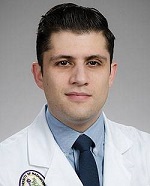Dr. Jonah Hebert-Davies is an Assistant Professor in the University of Washington Department of Orthopaedics and Sports Medicine and one of two recipients of the 2019-2020 CLEAR Center Pilot & Feasibility Awards.
Dr. Hebert-Davies’ Pilot & Feasibility Award project is entitled, “A Randomized Controlled Pilot Study Evaluating the Efficacy of Early Glenohumeral Cortisone Injection in Patients with Shoulder Stiffness Following Proximal Humerus Fractures,” and will determine the feasibility of performing a large-scale trial to address post traumatic decreased range of motion in patients with proximal humerus fractures.

Shoulder stiffness is a common complication of proxmial humerus fractures and has the potential to seriously impact daily function. Standard treatment includes physical therapy, home exercise, and “watchful waiting” to see if symptoms improve with time. In this study, Dr. Hebert-Davies and his team will examine whether or not steroid injections are a viable treatment option for this type of injury. This study will conduct pilot work to determine the feasibility of conducting a large scale multi-centered randomized trial to evaluate the viability of steroid injections as a treatment option for shoulder stiffness following proximal humerus fracture.
Patients participating in this study will be randomized to receive an ultrasound-guided intra-articular injection with lidocaine or an ultrasound-guided intra-articular cortisone injection. The team will examine clinical and functional outcomes at multiple timepoints to determine the feasibility of studying this treatment on a larger scale.
Of his work, Dr. Hebert-Davies says, “The CLEAR Center Pilot & Feasibility funding is the first step in establishing a robust protocol for a national multi-centered study. With the help of the CLEAR Center funding and mentorship, I am confident that I will be able to translate this project into a larger scale study. I was ecstatic to have received the Pilot & Feasibility funding and hope that future clinical studies may one day show benefit to patients dealing with this specific and often debilitating pathology.”
